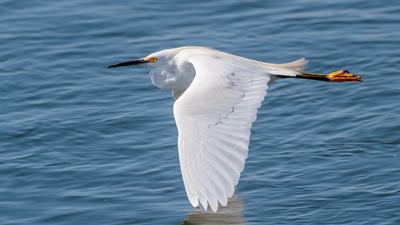Snowy egrets, once coveted for their feathers to decorate women's hats, is now protected under the Migratory Bird Treaty Act.. Alan Vernon / Flickr
A federal judge in New York has struck down the Trump administration’s attempt to roll back protections for migratory birds, writing that its reinterpretation of the Migratory Bird Treaty Act (MBTA) is “contrary to law,” several news outlets reported.
For more than a century, the MBTA has issued penalties to companies that harmed the thousands of bird species protected under the act. But in 2017, now-Interior Department Solicitor Daniel Jorjani wrote a legal view that companies should only be held liable if it could be proven they had killed birds intentionally. As journalist Ted Williams pointed out in a Yale Environment 360 article published earlier this year, this would mean that BP would not be responsible for the 1 million bird deaths that resulted from the 2010 Deepwater Horizon oil spill in the Gulf of Mexico; that oil and gas companies could not be fined for leaving wastewater pits — which attract and kill thousands of birds annually — uncovered; or that utility companies that didn’t insulate power lines could not be fined for electrocuting birds.
“It is not only a sin to kill a mockingbird, it is also a crime,” U.S. District Judge Valerie Caproni wrote in her ruling, citing To Kill a Mockingbird. “That has been the letter of the law for the past century. But if the Department of the Interior has its way, many mockingbirds and other migratory birds that delight people and support ecosystems throughout the country will be killed without legal consequence…
“There is nothing in the text of the MBTA that suggests that in order to fall within its prohibition, activity must be directed specifically at birds. Nor does the statute prohibit only intentionally killing migratory birds. And it certainly does not say that only ‘some’ kills are prohibited.”
The Interior Department’s rollback of the MBTA was challenged almost immediately after its announcement by a coalition of eight state attorneys general, including from New York, Maryland, New Jersey, Illinois, Massachusetts, Oregon, California, and New Mexico. It was joined by another legal challenge from a coalition of conservation groups, led by the National Audubon Society.
“This is a huge victory for birds and it comes at a critical time — science tells us that we’ve lost 3 billion birds in less than a human lifetime and that two-thirds of North American birds are at risk of extinction due to climate change,” Sarah Greenberger, interim chief conservation officer for the National Audubon Society, said in a statement.



